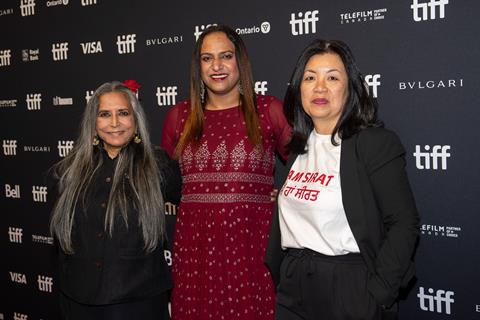
Toronto-based Indo Canadian filmmaker Deepa Mehta is famous for her unflinching look at Indian society through films such as her Elements trilogy — Fire, Earth, Water — and an adaptation of Salman Rushdie’s Midnight’s Children, all of which screened at TIFF. Her most recent film I Am Sirat premiered at the festival in 2023.
What was your first film in TIFF?
Sam & Me in 1991. It shot in Toronto and was invited to Cannes, where I met Piers Handling who said he’d like to invite the film to TIFF. I was more thrilled about it playing TIFF than Cannes, mainly because I had emigrated to Canada from India and had never felt a part of Canada, or that my work was in any way Canadian. I had never received any funding from Canadian government bodies and completely relied on private funding and international funds. I was invited to be in Toronto’s Perspectives Canada, which was very meaningful to me. That is my first memory of feeling Canadian.

Which notable TIFF premieres stand out?
Water opened the festival in 2005 and it was the first time we [TIFF] had a film in Hindi. It was about [how society treats] Indian widows. I got flak from people about why was a Canadian film opening the festival that wasn’t really Canadian. That started the dialogue about what makes a Canadian film, and what makes Canada. It’s a multicultural country, nobody can deny that now, but TIFF starting that conversation was imperative.
The subject matter was controversial and there had been protests and production in Varanasi, India, was ignominiously shut down in 2000. Five years later, with the second round of filming Water in Sri Lanka, I received Telefilm funding with one caveat: we had to shoot the film in English as well as Hindi. Fox Searchlight, as it was then called, released it in 2006 [in the US, Mongrel Media released in Canada in 2005].
I brought Midnight’s Children in 2012 after the world premiere in Telluride. Salman [Rushdie, Midnight’s Children author] is a dear friend, and I think that his coming to TIFF was fabulous for the film.

How has the festival evolved?
I like that there was a woman as head of the festival [Helga Stephenson] who had an uncanny way of espousing a broad vision while at the same time making it about Toronto. Then Piers came along and under him the festival actually became much larger. Its international footprint changed.
We had Perspectives Canada and Denys Arcand and all of us Canadians sort of landed there. Piers said we no longer needed Perspectives Canada; we needed our filmmakers to be seen on the larger international scene. That felt good. With Cameron [Bailey, current CEO], it has become much more international than it’s ever been.
What are your TIFF highlights down the years?
I was an ambassador for the Share Her Journey initiative, set up in 2017 to help women creators. TIFF is also about supporting young filmmakers from all backgrounds. That’s fabulous, especially now with what Donald Trump is doing to DEI [diversity, equity and inclusion] in the US.

























No comments yet